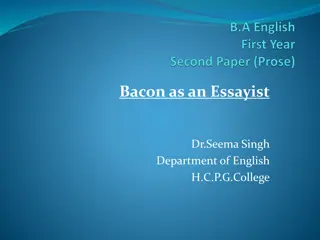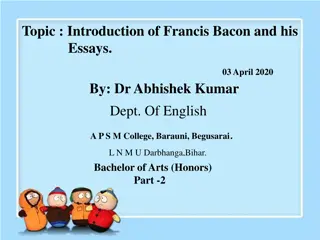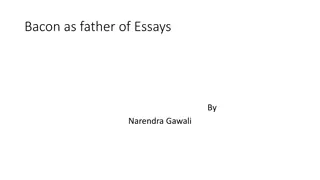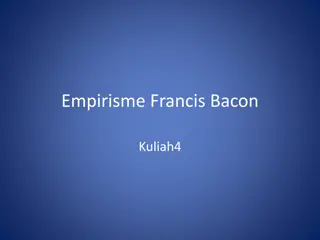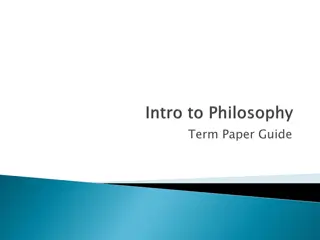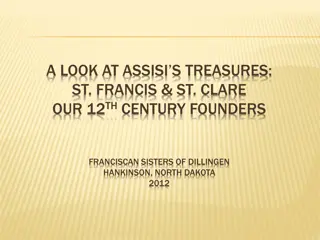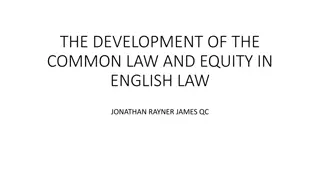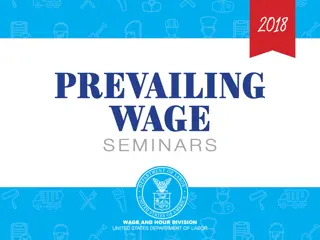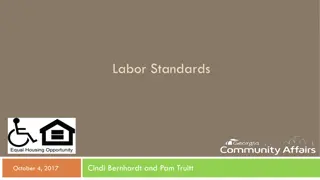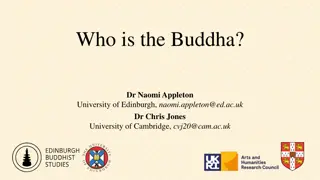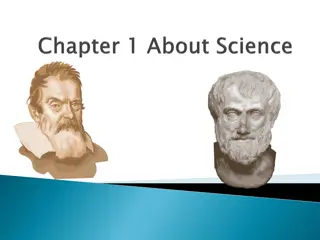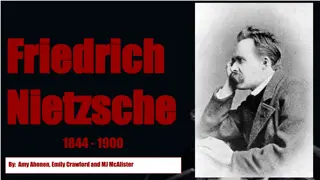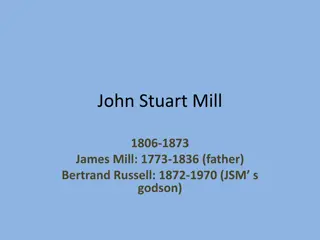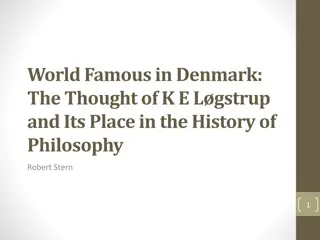Biography of Francis Bacon: English Philosopher and Statesman
Francis Bacon, also known as Lord Verulam, was a prominent English philosopher and statesman who significantly contributed to the development of the scientific method. Born in 1561 to a notable family, Bacon's early education and legal career laid the foundation for his influential role in English politics and philosophy. Despite financial hardships, he rose to hold prestigious positions such as Attorney General and Lord Chancellor of England. Bacon's legacy endures through his enduring impact on the scientific revolution.
Download Presentation

Please find below an Image/Link to download the presentation.
The content on the website is provided AS IS for your information and personal use only. It may not be sold, licensed, or shared on other websites without obtaining consent from the author. Download presentation by click this link. If you encounter any issues during the download, it is possible that the publisher has removed the file from their server.
E N D
Presentation Transcript
I. B. (PG) College Panipat
Presented By: Professor Priya Bareja Department of English I. B. PG College, Panipat
Class- M. A. Previous (English) Subject Literature in English 1550-1660 (II) Topic Francis Bacon
Francis Bacon[5](22 January 1561 9 April 1626), also known as Lord Verulam, was an English philosopher and statesman who served as Attorney General and as Lord Chancellor of England. His works are credited with developing the scientific method and remained influential through the scientific revolution.[6]
Youth and early maturity Bacon was born January 22, 1561, at York House off the Strand, London, the younger of the two sons of the lord keeper, Sir Nicholas Bacon, by his second marriage. Nicholas Bacon, born in comparatively humble circumstances, had risen to become lord keeper of the great seal. Francis cousin through his mother was Robert Cecil, later earl of Salisbury and chief minister of the crown at the end of Elizabeth I s reign and the beginning of James I s.
From 1573 to 1575 Bacon was educated at Trinity College, Cambridge, but his weak constitution caused him to suffer ill health there. His distaste for what he termed unfruitful Aristotelian philosophy began at Cambridge. From 1576 to 1579 Bacon was in France as a member of the English ambassador s suite. He was recalled abruptly after the sudden death of his father, who left him relatively little money. Bacon remained financially embarrassed virtually until his death.
Early legal career and political ambitions In 1576 Bacon had been admitted as an ancient (senior governor) of Gray s Inn, one of the four Inns of Court that served as institutions for legal education, in London. In 1579 he took up residence there and after becoming a barrister in 1582 progressed in time through the posts of reader (lecturer at the Inn), bencher (senior member of the Inn), and queen s (from 1603 king s) counsel extraordinary to those of solicitor general and attorney general.
Even as successful a legal career as this, however, did not satisfy his political and philosophical ambitions.
Bacon occupied himself with the tract Temporis Partus Maximus ( The Greatest Part of Time ) in 1582; it has not survived. In 1584 he sat as member of Parliament for Melcombe Regis in Dorset and subsequently represented Taunton, Liverpool, the County of Middlesex, Southampton, Ipswich, and the University of Cambridge.
In 1589 a Letter of Advice to the queen and An Advertisement Touching the Controversies of the Church of England indicated his political interests and showed a fair promise of political potential by reason of their levelheadedness and disposition to reconcile. In 1593 came a setback to his political hopes: he took a stand objecting to the government s intensified demand for subsidies to help meet the expenses of the war against Spain.
Elizabeth took offense, and Bacon was in disgrace during several critical years when there were chances for legal advancement.


